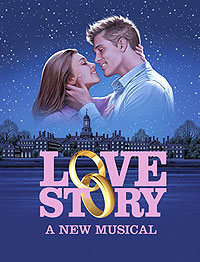Welcome back. Howard's research is impressive, and for me
personally it was nice to have some hard data to back up what I've always
believed: That musicals based on existing material are nothing new (and since
Howard doesn't go back before 1975, he's not even talking about all the
"golden age" classics that are based on plays and novels), and that
we weren't necessarily more highbrow back in the day. I especially liked this passage:
There’s absolutely nothing wrong with
musicals based on movies. When it is done with enough craft, with care and
talent, no one begrudges a show its origins, although there is a tendency to
now judge the source even before the show is produced. It would also appear
that, in many cases, the more successful examples of this genre are shows drawn
from lesser-known films; the rush to translate recent hit films hasn’t
necessarily meant greater box office success. Barreling ahead, I’ll say that
while I think we need original scores lest the craft of musical theatre
songwriting be lost, there have been terrifically entertaining and creative
shows based on music cobbled together from other sources, whether it be earlier
musicals, pop radio or a songwriter’s catalogue. Again, the only question is
whether it’s done artfully.
Howard's post – deliberately, unashamaedly – is about
Broadway and only Broadway. As I read,
"there simply aren’t enough of the big musical houses available, and so
fewer shows get on," I thought, there
are musicals happening everywhere, in far more than 40 houses! As if
reading my mind, Howard's next paragraph was this:
Although I can now speak only anecdotally,
I daresay there are more people than ever studying and writing new musicals. In
contrast to the golden age of the 40s and 50s, when the skill of writing
musicals was learned on the job or through mentorships, we now have
undergraduate and graduate programs in musical theatre; the regional theatre
network, founded primarily to mount plays, has discovered the artistic and
economic appeal of musicals; and there are countless developmental
opportunities under a variety of auspices.
Technically, I can only speak anecdotally too – but what
great anecdotes I have, from the very lucky position of getting to visit NAMT's
150 members from coast to coast and see the work they're doing.
I'm inspired to figure out how we might build a survey or
study to get hard numbers on this, but I can still say with certainty and no
small amount of joy that the new musical is alive and well all over America. If
I take issue with anything in Howard's piece, it's the word
"developmental," implying (though I don't think this is what he meant,
especially considering this great post about America's national
theatre) that Broadway is the only end point for a musical and that
any show that hasn't been there is still "in development."
Over 75% of the
288
shows presented in NAMT's Festival of New Musicals since 1989 have
had vibrant lives in regional theatres, been licensed, had cast recordings, and
helped their writers to make a living. Only three of those shows have been on
Broadway. Broadway is certainly a valuable branding tool for a new musical, to
say nothing of the potential national exposure of the Tony Awards telecast, but
to suggest that it's the automatic end goal for a show is to dismiss the
amazing work happening all over the country, at NAMT members and beyond.
As Howard rightly points out, "there are more people
than ever studying and writing new musicals." While this means more
competition for production opportunities and dollars, it also means an
incredible wealth of opportunity for musical theatre fans. In theatres across
America and abroad, the new musical is thriving, and lucky audiences get
to see new work every season.
I don't mean to suggest that there aren't problems. As
studied extensively in the book
Outrageous
Fortune: The Life and Times of the New American Play (from which
we took inspiration for our
2010
Fall Conference), in the current climate of
"world-premiere-itis" there is a real challenge in securing continued
life for new plays and musicals, and living wages for writers and other artists. The Broadway "stamp of approval" can certainly help the life of a show. But there are signs that this is changing. Several shows from recent Festivals
have had multiple productions over the last few years without ever coming to
New York. And licensing means these and other shows will be done by schools and
smaller professional companies, becoming the favorites of a new generation of
performers and audiences.
I grew up in New York, and before working at NAMT I both saw
and worked on shows almost exclusively in the city. Even now, it can be all too
easy to be blinded by the lights of those marquees just a few blocks away. But
now I also have the pleasure and privilege of working with our members
nationwide, and seeing what amazing work they do, in many cases providing
opportunities for writers to work in a quiet, calm and artistically safe
environment rarely found in the high pressure NYC commercial theatre.
These theatres are also cultivating new audience members who are
unafraid of new music and new stories, many of whom will never set foot on
Broadway. You might say that those of us in New York are the ones who are
missing out.


